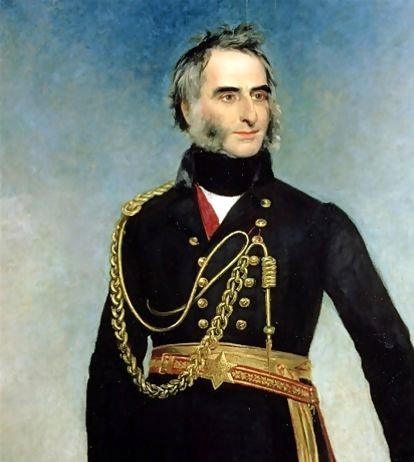

ARCTIC ARCHIPELAGO - The Searchers For Franklin
James Clark Ross

James Clark Ross, was another British naval officer, of a number, who searched for Franklin in the High Canadian North.
Ross was born in London, the nephew of John Ross who had established his reputation in the British Navy before his nephew became known. At the age of 12, James was signed into the records of the British Royal Navy, under, no doubt, the auspices of his uncle. At the age of 18, James was aboard his uncle's ship when John Ross sought the North-West Passage both in 1818, and in 1831.
His training not only came through his uncle, but also through another distinguished naval leader of the time, William Parry. James was with Parry on four Arctic expeditions through the years 1829-33. One of these voyages was the one when Parry explored, in 1821-23, the west side of Foxe Basin (James was but a midshipman at the time). In 1829, both Ross' spent two winters among "the Boothians1 of Neitchille, and Sir James explored part of King William Island, erecting his pillar or monument on the now famous Point Victory."2 (See Map.)
In 1834, James Ross was promoted to Captain. In 1835, he was put in charge of an expedition to save a number of whaling ships that had, because of a bad season, been caught in Baffin Bay. By the time Ross got there, the whaling ships had already extricated themselves and had sailed for England; Ross and his crew returned safely back to England. And so, we come to James Ross' most famous voyage, that of 1839-43, undertaken to explore the coasts of the continent of Antarctica, a piece of history I have dealt with, in my work on Robert Scott.3 Germain to this work, Arctic Archipelago, is that James Ross on his expedition to the Antarctic, had under his command two ships: HMS Erebus and HMS Terror, with Francis Crozier second in command and the immediate captain of the Terror.
With his return from his explorations in the Antarctic, James Ross became one of the leading lights in the British Navy. So, it should be no surprise, that in 1848, he was appointed to lead one of three expeditions of that year to find Franklin. (The others were the Rae/Richardson overland expedition and that of the Plover going west to east beginning at the Bering Strait.) In Ross' 1848 search, he was given the Enterprise and to accompanied him, the Investigator (McClintock). The two ships did not manage to penetrate the Lancaster Sound to any great extent before they were forced to stop. They wintered over at Port Leopold on the north-east point of Somerset Island. (See Map.) In the spring, Ross and McClintock had determined, in their travels by sledge, that Peel Sound was too ice-choked for Franklin to have used it. (In fact Franklin had used it in 1846.) I quote DCB:
1 In 1829, Felix Booth (the Booth family were long famous for their distilleries) "provided £17,000 for the expenses of the expedition, to which Captain Ross had added £3,000, and the result was an immense stride in the progress of geographical science. The grateful commander gave the name of his patron to several of his discoveries on land and sea-Gulf of Boothia, Isthmus of Boothia, Continent of Boothia Felix, Felix Harbour, Cape Felix ..." (Wikipedia)
2 McClintock, The Voyage of the 'Fox'..., p. 51.
3 I touched on James Clark Ross in my work on Robert Scott's explorations of Antarctica, particularly in the first chapter, "Earlier Exploration."
4 Clive Holland, http://www.biographi.ca/en/bio/mcclintock_francis_leopold_13E.html
"... in the spring four sledge parties looked for Franklin. Ross and McClintock made the longest and most successful journey, between 15 May and 23 June, when they sledged along the north coast of Somerset Island and then down its west side, which had not yet been explored by Europeans. They found no trace of Franklin, but mapped about 150 nautical miles of shoreline."4
By 1849, James Ross was back in England. He then decided, with encouragement from his wife, to give up active sea duty. James, his wife and their four children settled at Aylesbury (somewhat between Oxford and London). There, James lived out his life quietly. He died in 1862.
_______________________________
NOTES
Peter Landry
2015